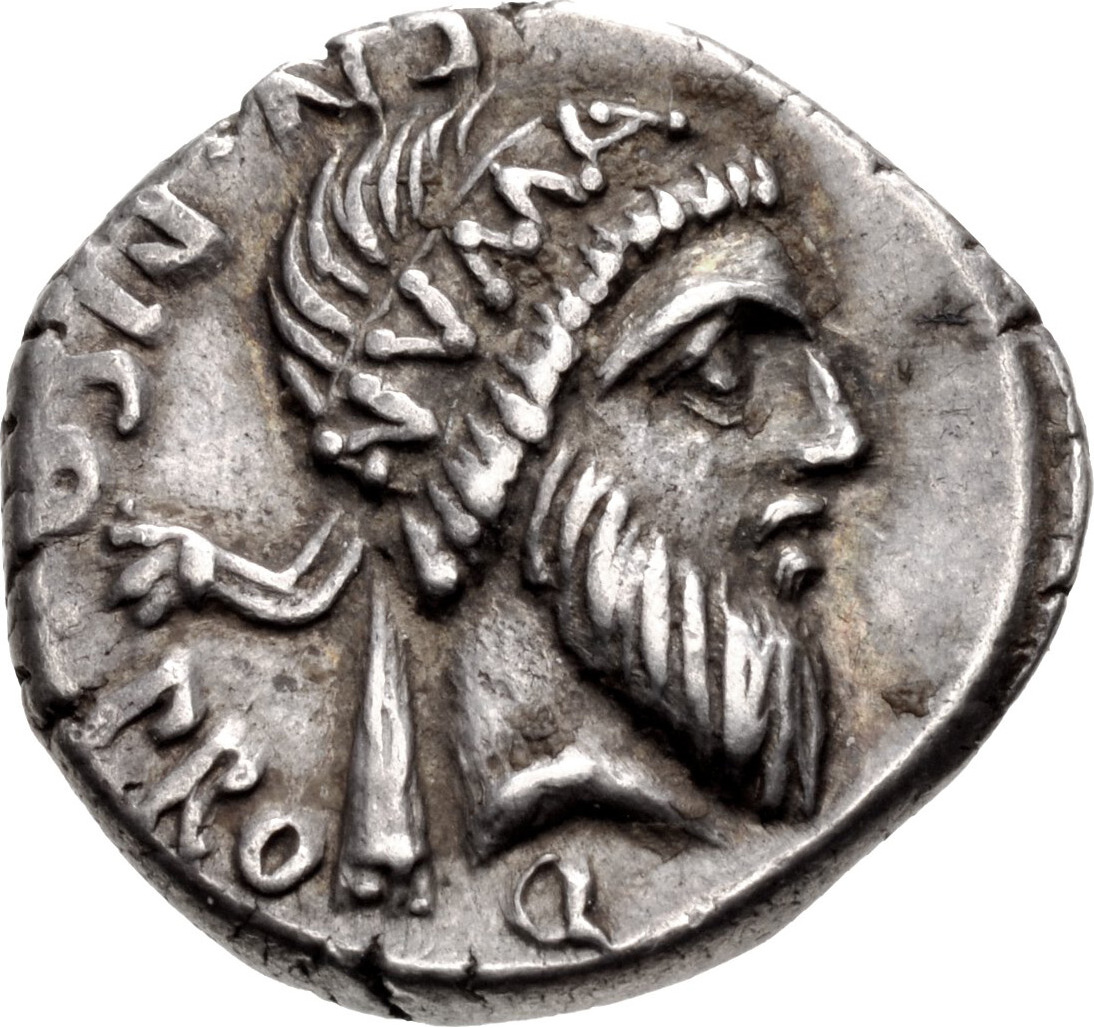
Numa Pompilius
Numa Pompilius (Classical Latin: [ˈnʊma pɔmˈpɪliʊs]; c. 753–672 BC; reigned 715–672 BC) was the legendary second king of Rome,[1] succeeding Romulus after a one-year interregnum.[2] He was of Sabine origin, and many of Rome's most important religious and political institutions are attributed to him, such as the Roman calendar, Vestal Virgins, the cult of Mars, the cult of Jupiter, the cult of Romulus, and the office of pontifex maximus.[2]
Numa Pompilius
Peacemaker[edit]
Plutarch depict Numa as a powerful peacemaker. Making the Romans more peaceful was one of his main targets from the beginning of the kingship and many of his actions were directly or indirectly intended to achieve this aim. He succeeded so much that the situation was even better than described in the song:
"And on the iron-bound shield-handles lie the tawneyº spiders' webs"; "rust now subdues the sharp-pointed spears and two-edged swords; no longer is the blast of brazen trumpets heard, nor are the eyelids robbed of delicious sleep."
According to Plutarch, any conflicts were excluded not only from Rome but from all Italy. The roads became safe and feasts and festivals prevailed. Nobody tried to hurt Numa, to take his place. When Numa died, from natural causes, people friendly to Rome come from many places to honour him. Plutarch put this in contrast to the policies and the destiny of his predecessors and successors: Romulus who is depicted as war-king and the 5 kings after him, from which 4 were killed and 1 dethroned and expelled from Rome.[38]
Story of the books of Numa[edit]
Livy narrates that, in 181 BC, while digging in the field of the scriba L. Petilius at the foot of the Ianiculum, peasants found two stone coffers, eight feet long and four feet wide, inscribed both in Latin and in Greek characters, one stating that Numa Pompilus, son of Pompon, king of the Romans was buried (there) and the other that Numa's books were inside it. When Petilius after the advice of his friends opened it, the one that was inscribed with the name of the king was found empty, the other containing two bundles each of seven books, not complete but looking very recent, seven in Latin dealing with pontifical law and seven in Greek of philosophy as it was in that remote past.
The books were shown to other people and the fact became public. Praetor Q. Petilius, who was friends with L. Petilius, requested them, found them very dangerous to religion and told Lucius he would have them burnt, but he allowed him to try and recover them by legal or other means. The scriba brought the case to the tribunes of the plebs, and the tribunes in turn brought it to the senate. The praetor declared he was ready to swear an oath that it was not a good thing either to read or to store those books, and the senate deliberated that the offer of the oath was sufficient by itself, that the books be burnt on the Comitium as soon as possible and that an indemnity fixed by the praetor and the tribunes be paid to the owner. L. Petilius though declined to accept the sum. The books were burnt by the victimarii.
The action of the praetor has been seen as politically motivated, and in accord with the Catonian reaction of those years.[39] It is relevant though that some of the annalists of those times or only a few years later, do not seem to show any doubt about the authenticity of the books.[40] The whole incident has been critically analyzed again by philologist E. Peruzzi, who by comparing the different versions, strives to demonstrate the overall authenticity of the books.[41] By contrast, M.J. Pena's position is more reserved and critical.[42]
Francophone scholars A. Delatte and J. Carcopino believe the incident to be the result of a real initiative of the pythagoric sect of Rome.[43] The fears of the Roman authorities should be explained in connection to the nature of the doctrines contained in the books, which are supposed to have contained a type of physikòs lógos, a partly moral and partly cosmological interpretation of religious beliefs that has been proven by Delatte to be proper of the ancient pythagorism. Part of it must have been in contradiction with the beliefs of fulgural and augural art and of the procuratio of the prodigies.[44] Most ancient authors relate the presence of treatises of pythagoric philosophy, but some, as Sempronius Tuditanus,[45] mention only religious decrees.[46]
Later traditions[edit]
The Christian philosopher Clement of Alexandria in his book Stromata claimed that King Numa Pompilius was influenced by Mosaic law, and due to this refrained from making human images in sculpture.[47] Modern scholars do not accept this claim, as there were no known contacts between the early Kings of Rome and the ancient Hebrews.
Numa Pompilius continued to be remembered well into the later centuries of the Eastern Roman Empire. Composing Novellae Constitutiones, 7th-century Emperor Justinian I recalled Numa alongside Romulus as two of the Roman state's founders, with Numa being the one who first "organised and enhanced [the city of Rome], by means of laws."[48] In a similar manner, the Coptic monophysite bishop John of Nikiû likened Empress Theodora, consort of Justinian, to four prominent figures of Roman history (Romulus, Numa, Caesar, Augustus), citing her reforms aimed at eradicating prostitution.[49] In the 11th century, Michael Psellos wrote his Chronographia with an intent to provide pedagogical models for his student, Emperor Michael VII Doukas, and when reviewing the seven kings of Rome he lauded Numa as pious, peaceable, and "a man not only well worth seeing for his physical appearance but also equipped with all sorts of mental virtues, and a lover of all wisdom."[50]